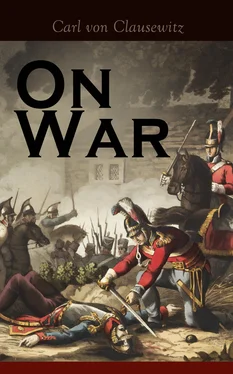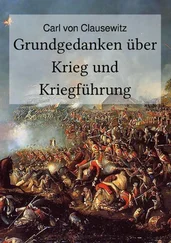This illustration is intended to give more clearness to the course of our ideas, and in closing this chapter we will only briefly observe that in our exposition of Strategy we shall describe those separate subjects which appear to us the most important, whether of a moral or material nature; then proceed from the simple to the complex, and conclude with the inner connection of the whole act of War, in other words, with the plan for a War or campaign.
In an earlier manuscript of the second book are the following passages endorsed by the author himself to be used for the first Chapter of the second Book: the projected revision of that chapter not having been made, the passages referred to are introduced here in full.
By the mere assemblage of armed forces at a particular point, a battle there becomes possible, but does not always take place. Is that possibility now to be regarded as a reality and therefore an effective thing? Certainly, it is so by its results, and these effects, whatever they may be, can never fail.
1. POSSIBLE COMBATS ARE ON ACCOUNT OF THEIR RESULTS TO BE LOOKED UPON AS REAL ONES.
If a detachment is sent away to cut off the retreat of a flying enemy, and the enemy surrenders in consequence without further resistance, still it is through the combat which is offered to him by this detachment sent after him that he is brought to his decision.
If a part of our Army occupies an enemy’s province which was undefended, and thus deprives the enemy of very considerable means of keeping up the strength of his Army, it is entirely through the battle which our detached body gives the enemy to expect, in case he seeks to recover the lost province, that we remain in possession of the same.
In both cases, therefore, the mere possibility of a battle has produced results, and is therefore to be classed amongst actual events. Suppose that in these cases the enemy has opposed our troops with others superior in force, and thus forced ours to give up their object without a combat, then certainly our plan has failed, but the battle which we offered at (either of) those points has not on that account been without effect, for it attracted the enemy’s forces to that point. And in case our whole undertaking has done us harm, it cannot be said that these positions, these possible battles, have been attended with no results; their effects, then, are similar to those of a lost battle.
In this manner we see that the destruction of the enemy’s military forces, the overthrow of the enemy’s power, is only to be done through the effect of a battle, whether it be that it actually takes place, or that it is merely offered, and not accepted.
2. TWOFOLD OBJECT OF THE COMBAT.
But these effects are of two kinds, direct and indirect they are of the latter, if other things intrude themselves and become the object of the combat—things which cannot be regarded as the destruction of enemy’s force, but only leading up to it, certainly by a circuitous road, but with so much the greater effect. The possession of provinces, towns, fortresses, roads, bridges, magazines, &c., may be the immediate object of a battle, but never the ultimate one. Things of this description can never be, looked upon otherwise than as means of gaining greater superiority, so as at last to offer battle to the enemy in such a way that it will be impossible for him to accept it. Therefore all these things must only be regarded as intermediate links, steps, as it were, leading up to the effectual principle, but never as that principle itself.
In 1814, by the capture of Buonaparte’s capital the object of the War was attained. The political divisions which had their roots in Paris came into active operation, and an enormous split left the power of the Emperor to collapse of itself. Nevertheless the point of view from which we must look at all this is, that through these causes the forces and defensive means of Buonaparte were suddenly very much diminished, the superiority of the Allies, therefore, just in the same measure increased, and any further resistance then became impossible . It was this impossibility which produced the peace with France. If we suppose the forces of the Allies at that moment diminished to a like extent through external causes;—if the superiority vanishes, then at the same time vanishes also all the effect and importance of the taking of Paris.
We have gone through this chain of argument in order to show that this is the natural and only true view of the thing from which it derives its importance. It leads always back to the question, What at any given moment of the War or campaign will be the probable result of the great or small combats which the two sides might offer to each other? In the consideration of a plan for a campaign, this question only is decisive as to the measures which are to be taken all through from the very commencement.
4. WHEN THIS VIEW IS NOT TAKEN, THEN A FALSE VALUE IS GIVEN TO OTHER THINGS.
If we do not accustom ourselves to look upon War, and the single campaigns in a War, as a chain which is all composed of battles strung together, one of which always brings on another; if we adopt the idea that the taking of a certain geographical point, the occupation of an undefended province, is in itself anything; then we are very likely to regard it as an acquisition which we may retain; and if we look at it so, and not as a term in the whole series of events, we do not ask ourselves whether this possession may not lead to greater disadvantages hereafter. How often we find this mistake recurring in military history.
We might say that, just as in commerce the merchant cannot set apart and place in security gains from one single transaction by itself, so in War a single advantage cannot be separated from the result of the whole. Just as the former must always operate with the whole bulk of his means, just so in War, only the sum total will decide on the advantage or disadvantage of each item.
If the mind’s eye is always directed upon the series of combats, so far as they can be seen beforehand, then it is always looking in the right direction, and thereby the motion of the force acquires that rapidity, that is to say, willing and doing acquire that energy which is suitable to the matter, and which is not to be thwarted or turned aside by extraneous influences. 15
14.This paragraph refers to the works of Lloyd, Bülow, indeed to all the eighteenth-century writers, from whose influence we in England are not even yet free.—ED.
15.The whole of this chapter is directed against the theories of the Austrian Staff in 1814. It may be taken as the foundation of the modern teaching of the Prussian General Staff. See especially von Kämmer.—ED.
CHAPTER II.
Elements of Strategy
Table of Contents
The causes which condition the use of the combat in Strategy may be easily divided into elements of different kinds, such as the moral, physical, mathematical, geographical and statistical elements.
The first class includes all that can be called forth by moral qualities and effects; to the second belong the whole mass of the military force, its organisation, the proportion of the three arms, &c. &c.; to the third, the angle of the lines of operation, the concentric and eccentric movements in as far as their geometrical nature has any value in the calculation; to the fourth, the influences of country, such as commanding points, hills, rivers, woods, roads, &c. &c.; lastly, to the fifth, all the means of supply. The separation of these things once for all in the mind does good in giving clearness and helping us to estimate at once, at a higher or lower value, the different classes as we pass onwards. For, in considering them separately, many lose of themselves their borrowed importance; one feels, for instance, quite plainly that the value of a base of operations, even if we look at nothing in it but its relative position to the line of operations, depends much less in that simple form on the geometrical element of the angle which they form with one another, than on the nature of the roads and the country through which they pass.
Читать дальше












